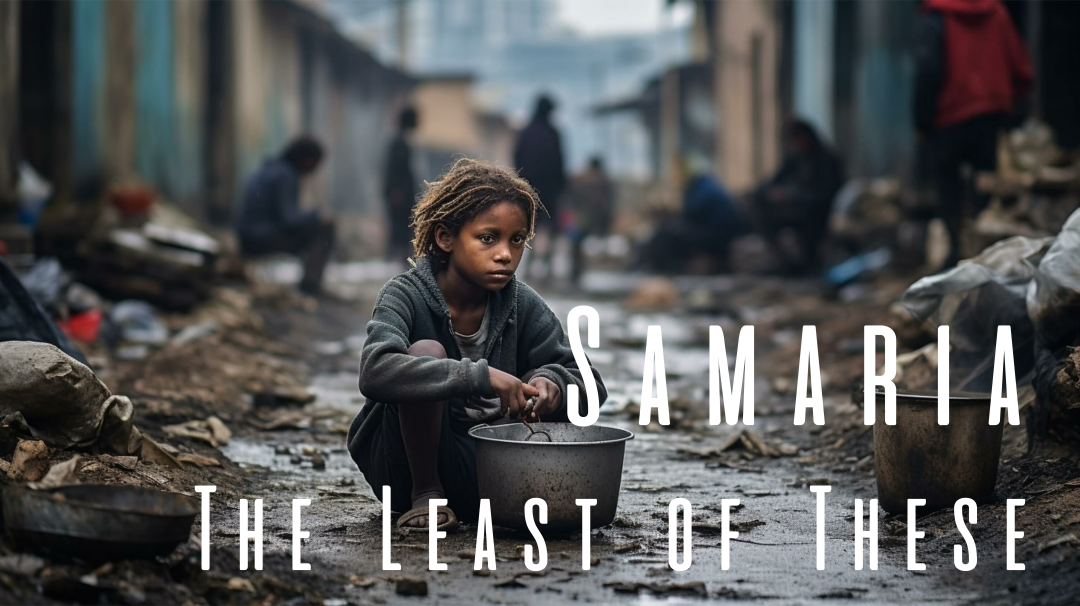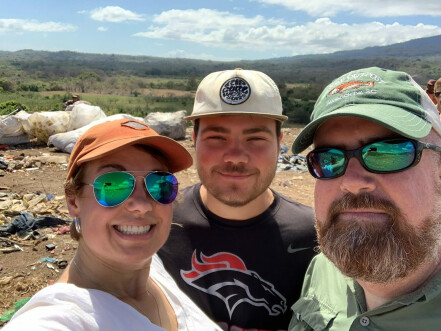
We hear words and phrases used in the “Christian community” that we do not hear often in most other areas of our culture. “The least of these” is one that I hear used in many ways to describe people, but what was Jesus’ true meaning when He used this phrase in Matthew 25?
And the King will answer them, ‘Truly, I say to you, as you did it to one of the least of these my brothers, you did it to me.’
Matthew 25:40
He is clearly speaking of people who are in need. In need of what?
The Jews of Jesus’ time had a great disdain for the Samaritans. They were a neighboring nation that inhabited an ancient area of great historical significance. The story of Elijah and King Ahab took place in this region. Along with the journey of Abraham and his descendants. Jacob built a well there that we will talk about later. Samaria, during the time of Jesus, had a very diverse population. Many people from other nations and religions inhabited this land. The Jews would intentionally go out of their way to avoid traveling through Samaria. Samaritans were considered the lowest of the low, unclean. Yet, they were not what we would consider needy and not a particularly poor nation. They were just different than the Jews of the time.
Perspective
In early March 2020, my son Cauy was in Nicaragua. He was finishing up a nine-month mission trip to Eswatini, Myanmar, Thailand, and Nicaragua. It was a gap year mission trip that started the August after he graduated high school. We had not seen him since he left and there had been very little communication. The organization had a parent trip set for us to meet him in Nicaragua the first week in March. Think back to what was happening in the world in March 2020…that’s right, COVID. A couple of days before we were set to leave, his sending organization canceled the trip.
The mission base in Nicaragua spoke up and said we could still come if we wanted to come. We did and we went. My sole intent of going was to see my son. I wasn’t concerned about the ministry opportunities that the base offered or the people there. I wanted to see my son. Angela and I arrived and within 48 hours of being there, Cauy’s sending organization pulled the team from the field. Flights were booked and 12 hours later Cauy and his team were on a plane headed back home. While all of this was transpiring, I got an email from the State Department telling us that we had 72 hours to return to the U.S. or we may not be able to get back home. Flights were full of people leaving. We did secure a flight, but it was outside of the 72-hour window.
While we waited, we decided to make the best of the situation and blended into the local ministry. Before Cauy left, we had already gone to the dump for an opportunity to feed and pray for the people who gather recycled materials from the trash as a source of income. We did a prayer walk with the team and some of the local ministry leaders. We visited people in their homes and were able to pray for them and spent time talking to them about the Hope that only comes from Jesus.
The next few days changed my life. Cauy was back home safe and resting. Angela and I were immersed in a community that has immeasurable needs. No medical care, scarce clean water, and very little opportunity for work are just a few of the issues. I walked that community with ex-gang members who had found Jesus and were sharing the Gospel and praying for people who were literally dying.
Those few days set me on a path that God had waiting for me. I have returned with teams from Bay Life over the last few years and plan on returning again and again. I’ve witnessed men who were once destroying that community through drugs and violence, pray and weep for a 90-year-old woman who gets to eat once a day if she is lucky. I’ve seen the healing of wounds and diseases that should have been fatal. I’ve seen guys who have been addicted to drugs for decades walk away from it and become the father that their family desperately needs. I’ve seen many lives saved through God’s amazing plan of salvation. All because Jesus came and died for them. The ultimate sacrifice for “the least of these.”

The Well
Nicaragua was well outside of my comfort zone at the time. My Spanish wasn’t good. It was hot and we walked a lot in unfamiliar areas with people who were completely different than me. Jesus has a way of making all of that great… In John chapter four, when Jesus told the disciples that they were going through Samaria, they protested. There were longer ways around but at least they didn’t have to interact with the awful people there. He purposely led them to the well, as I mentioned earlier, for a divine appointment with not only a Samaritan but a woman. A woman who, in her own community, was considered less than. She was even at the well during the midday to avoid associating with the other people of her town. He revealed himself to her as the Messiah and she believed! So much so that she went back to town and shared her testimony.
Many Samaritans from that town believed in him because of the woman’s testimony, “He told me all that I ever did.” So when the Samaritans came to him, they asked him to stay with them, and he stayed there two days. And many more believed because of his word.
John 4:39-41
Not only did he intentionally go through Samaria, but He stayed and many more believed. Jesus shows us that no matter what our culture tells us, it is our responsibility to minister to anyone and everyone. If Jesus’ actions went against accepted cultural standards, shouldn’t ours?
In Need of What?
Whether it is the people of Nicaragua, the homeless in the U.S., the widowed, the orphaned, or the unreached people in the world, it is our responsibility as devoted followers of Jesus, to help meet their needs. We all know the basic needs of humans—food, shelter, clothing. Beyond that, people need medical care, they need to be safe, they need to feel loved, they need to be seen and heard, and, most importantly, they need hope. A hope that changes their outlook on life. A mind-altering, life-changing hope that fills them with the joy that only comes from a relationship with Jesus.
In Matthew 25, I firmly believe that Jesus is talking about the people who have nothing and cannot meet basic needs. What if He was also talking about people who don’t know about the opportunity of eternal life?
Responsibility
I have been using the word responsibility throughout this blog. I don’t use it lightly. It is our responsibility to care for people. Not everyone is called to foreign missions long-term, but I do believe that everyone is called to experience the perspective-changing opportunity that a short-term mission trip provides. (Shameless plug—I am leading a trip to Nicaragua in October, join me!) We are called to care for the people that God puts in our path on a daily basis. My daughter, Raegan, is a funeral director, and she cares and ministers to people who are going through the loss of a loved one. A job that few people are capable of doing. I would struggle to deal with grief and death every day. She does it and does it well. We are called and it is our responsibility daily. It might look different for each of us, but the result is the same.
Jesus commands us in Acts 1:8 to witness to the world. Just as the Samaritan woman went and witnessed to her town. We are called to witness to the people in our lives and beyond.
But you will receive power when the Holy Spirit has come upon you, and you will be my witnesses in Jerusalem and in all Judea and Samaria, and to the end of the earth.
Acts 1:8
When we care for the “least of these” we show the world the love that Jesus has shown us and that they can have the same hope and joy that we possess through Him. Whether they are from a different country or a different religion, they choose a different lifestyle, Jesus loves them, so we should also.
It’s our duty as humans to help people with the necessities of this life. It is our responsibility as followers of Jesus to tell them about the eternal life available through Him alone! Whether it be from the words we speak or the love that we show them.

